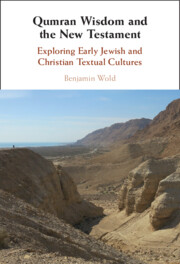Book contents
- Qumran Wisdom and the New Testament
- Qumran Wisdom and the New Testament
- Copyright page
- Dedication
- Contents
- Preface
- Acknowledgments
- Introduction
- 1 Cosmology and Eschatology
- 2 Universalism and Particularism
- 3 Wisdom As Action
- 4 Poverty and Humility
- 5 Debt Remission in the Matthean Lord’s Prayer
- 6 Paul
- Conclusion
- Bibliography
- Index
4 - Poverty and Humility
Published online by Cambridge University Press: 22 December 2022
- Qumran Wisdom and the New Testament
- Qumran Wisdom and the New Testament
- Copyright page
- Dedication
- Contents
- Preface
- Acknowledgments
- Introduction
- 1 Cosmology and Eschatology
- 2 Universalism and Particularism
- 3 Wisdom As Action
- 4 Poverty and Humility
- 5 Debt Remission in the Matthean Lord’s Prayer
- 6 Paul
- Conclusion
- Bibliography
- Index
Summary
Among the more prevalent topics within ethical instruction are issues related to wealth and poverty. Economics are part of the very fabric of human existence, offering frameworks for provision and sustenance that allow societies to function, survive, and even thrive. Whether modeled on capitalism, socialism, communism, or medieval feudalism, these systems and their various iterations have resulted in uprisings, revolutions, and war. It is little wonder that a great deal is invested into questions about morality as it pertains to wealth and want, or that the language associated with economics has developed to include a multiplicity of layers with rich intertexture between the material, social, and ethical worlds.
- Type
- Chapter
- Information
- Qumran Wisdom and the New TestamentExploring Early Jewish and Christian Textual Cultures, pp. 116 - 149Publisher: Cambridge University PressPrint publication year: 2022

